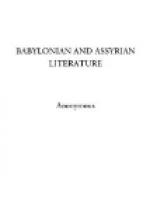(Of the two next and last lines only the last word, “the universe,” remains.)
[Footnote 1: Literally, “warlike expedition.”]
[Footnote 2: In the Accadian, “day (and) night.”]
[Footnote 3: “Masal” (mashal), as in Hebrew, “a proverb.”]
[Footnote 4: Literally, “tablet.”]
[Footnote 5: It is evident that the poem was to be used as a charm in case of sickness. Compare the phylacteries of the Jews.]
[Transcriber’s Note: The following footnote (6) is illegible in many places. Illegible areas are marked with a ’’.]
[Footnote 6: “Nin-ci-gal” ("the Lady of the Empty Country”) was Queen of s, and identified with Gula, or , “chaos” ["bohu”] of Gen-*, *, “the Lady of the House of Death.”]
[Footnote 7: In the Accadian, “the sick head (and) sick heart.” Then follows a lacuna.]
[Footnote 8: Apparently another name of Nin-ci-gal.]
[Footnote 9: Lacuna.]
[Footnote 10: Compare the Greek idea of Delphi as the central [Greek: omphalos] or “navel” of the earth.]
[Footnote 1: Zicum, or Zigara, was the primeval goddess, “the mother of Anu and the gods.”]
[Footnote 2: Lacuna.]
[Footnote 3: That is, of Zicum.]
[Footnote 4: Tammuz, called “Du-zi” ("the [only] son”) in Accadian, was a form of the sun-god. His death through the darkness of winter caused Istar to descend into Hades in search of him.]
CHARM FOR AVERTING THE SEVEN EVIL SPIRITS
For the sake of completeness a charm for averting the attack of the seven evil spirits or storm-clouds may be added here, though the larger part of it has already been translated by Mr. Fox Talbot in “Records of the Past,” Vol. Ill, p. 143. It forms part of the great collection of magical formulae, and is lithographed in the “Cuneiform Inscriptions of Western Asia,” Vol. IV, pl. 2, col. v, lines 30-60.
1 Seven (are) they, seven (are) they! 2 In the
channel of the deep seven (are) they! 3 (In) the
radiance of heaven seven (are) they! 4 In the channel
of the deep in a palace grew they up. 5 Male they
(are) not, female they (are) not.[1] 6 (In) the
midst of the deep (are) their paths. 7 Wife they
have not, son they have not. 8 Order (and) kindness
know they not. 9 Prayer (and) supplication hear
they not. 10 The cavern in the mountain they
enter. 11 Unto Hea (are) they hostile. 12 The throne-bearers
of the gods (are) they. 13 Disturbing the lily
in the torrents are they set. 14 Baleful (are) they,
baleful (are) they. 15 Seven (are) they, seven (are)
they, seven twice again (are) they. 16 May the spirits
of heaven remember, may the spirits of
earth remember.
[Footnote 1: The Accadian text, “Female they are not, male they are not.” This order is in accordance with the position held by the woman in Accad; in the Accadian Table of Laws, for instance, translated in “Records of the Past,” vol. iii. p. 23, the denial of the father by the son is punished very leniently in comparison with the denial of the mother.]




